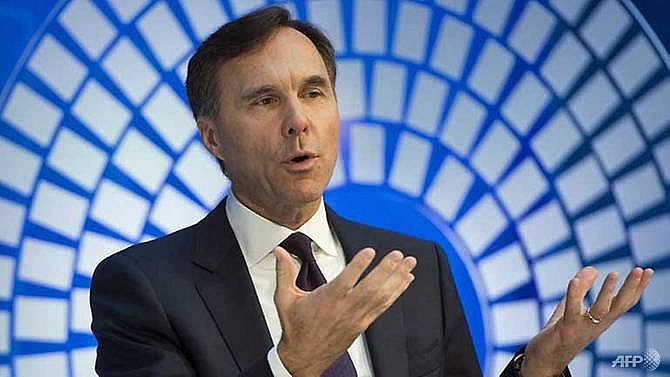Canada goes deeper into debt to compete with Trump tax cuts
 |
| Canadian Minister of Finance William Morneau speaks during a CNN Debate on the Global Economy during the World Bank Group / International Monetary Fund Annual Meetings at IMF Headquarters in Washington, DC, on Oct 12, 2017. (SAUL LOEB/AFP) |
The delivery of Can$17.6 billion (US$13.3 billion) in new spending and forgone revenue over six years comes after US President Donald Trump brought in massive US corporate tax cuts that have taken a bite out of investment in Canada.
The Canadian measures include accelerated capital cost allowances and more tax write-offs of equipment and machinery to encourage businesses to invest in Canada, sooner.
The government also pledged to build additional port and rail infrastructure to get more goods to Atlantic and Pacific ports and tap new overseas markets in an attempt to diversify trade.
Nearly 80 per cent of Canada's current trade is with its US neighbour.
The government also offered a hand to struggling Canadian media by allowing non-profit news organisations to apply for charitable tax status, and providing tax credits to newsrooms that expand local coverage as well as to Canadians who buy digital newspaper subscriptions.
Opposition parties spent the day hammering Prime Minister Justin Trudeau for breaking his balanced budget promise.
Trudeau had vowed in the 2015 election campaign to post small budget deficits of about Can$10 billion per year, before returning to balance in 2019 when he will again face the electorate.
In a speech to parliament, Finance Minister Bill Morneau said dealing with "a new administration in the United States" has posed "some interesting challenges."
"The current (US) administration has moved forward with an aggressive package of tax cuts for large corporations," he noted.
"Some have lobbied us to match those measures," he said. "If we were to do that, it would add tens of billions in new debt (and) it would do more to worsen income inequality in Canada than improve it."
In his fiscal update, growth was forecast to slow to 2.0 percent in 2018 and 2019, while the government plans to continue posting deficits of more than Can$10 billion through to 2023-24.
It was estimated in Morneau's February budget at Can$18.1 billion this year.
In the update, higher spending (Can$344.1 billion) was forecast to outpace a boost in revenues (Can$328.9 billion), but the deficit was expected to remain unchanged.
Meanwhile the revised federal debt was predicted to rise to Can$687.7 billion or 30.9 per cent of the economy this year.
What the stars mean:
★ Poor ★ ★ Promising ★★★ Good ★★★★ Very good ★★★★★ Exceptional
Related Contents
Latest News
More News
- Russian President congratulates Vietnamese Party leader during phone talks (January 25, 2026 | 09:58)
- Worldwide congratulations underscore confidence in Vietnam’s 14th Party Congress (January 23, 2026 | 09:02)
- Political parties, organisations, int’l friends send congratulations to 14th National Party Congress (January 22, 2026 | 09:33)
- 14th National Party Congress: Japanese media highlight Vietnam’s growth targets (January 21, 2026 | 09:46)
- 14th National Party Congress: Driving force for Vietnam to continue renewal, innovation, breakthroughs (January 21, 2026 | 09:42)
- Vietnam remains spiritual support for progressive forces: Colombian party leader (January 21, 2026 | 08:00)
- Int'l media provides large coverage of 14th National Party Congress's first working day (January 20, 2026 | 09:09)
- Vietnamese firms win top honours at ASEAN Digital Awards (January 16, 2026 | 16:45)
- ASEAN Digital Ministers' Meeting opens in Hanoi (January 15, 2026 | 15:33)
- ASEAN economies move up the global chip value chain (December 09, 2025 | 13:32)

 Tag:
Tag:




















 Mobile Version
Mobile Version